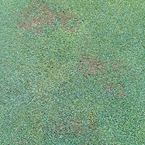// Problem
Pink and grey snow moulds are devastating turf diseases that occur on golf course putting greens, tees and fairways in the presence of snow cover. These diseases are not only unsightly in the spring but can leave the turf surfaces unplayable. Both pink and grey snow moulds can affect all cool-season turfgrasses but tend to be more problematic on annual bluegrass and bentgrasses.
// What to look for
Pink snow mould, caused by Microdochium nivale, occurs in cold (0-10ºC), wet weather with intermittent periods of snow cover (less than 60 days). Symptoms are visible at snow melt as tan patches 5-30 cm in diameter with a pink border. The affected areas change in colour to a whitish grey with leaves taking on a bleached appearance. Individual patches may coalesce, resulting in extensive damage to the turf.
// Envu Solutions
Implementing proper cultural practices will assist in reducing disease severity. Management strategies include: avoiding late fall fertilization that leads to lush growth, controlling excessive thatch, removing tree leaves from the turf, controlling drifting snow, and removing snow/improving drainage to promote rapid drying in the early spring.
A pre-snow preventive application is critical for protecting vulnerable turf areas from snow mould. While disease symptoms develop under snow cover, sclerotia begin to germinate in the fall at 10-18ºC. An additional application during this time period has been shown to reduce disease severity the following spring. After your last mowing of the season but prior to snow cover, a final fungicide application is needed. Products or mixtures containing two to three different active ingredients like DedicateTM Stressgard® have been shown to provide exceptional snow mould control.
The following table shows recommended products or mixtures for greens, tees, and fairways based on the type of snow mould and length of snow cover expected.*
// Resources




